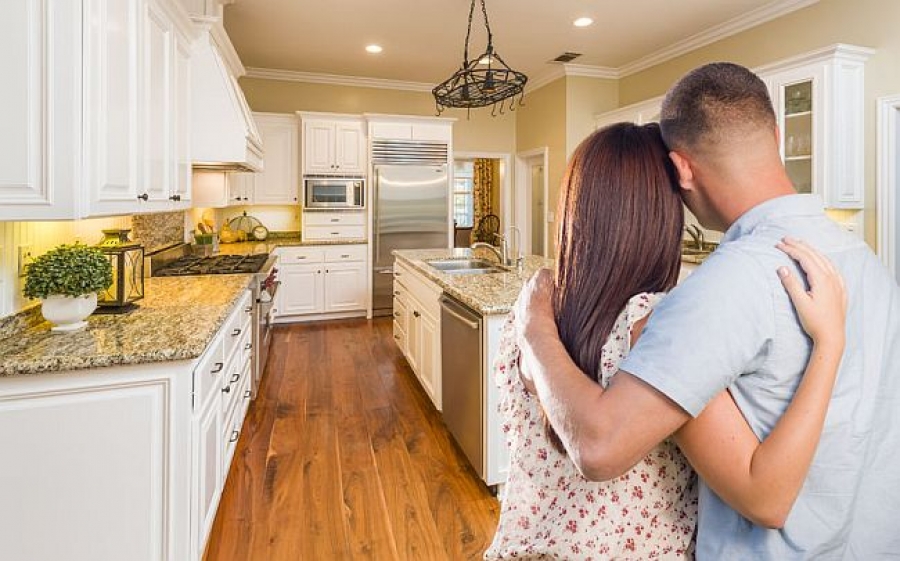Between rising prices, tough loan limits, and massive competition among other eager would-be buyers, it can seem like an impossible feat to purchase your first home. Homes in first-time buyer ranges are highly coveted and stories abound of buyers having made offers on numerous homes, only to be shut out time and again by multiple offers that drive prices up and out of their budget. But, there are ways you can put yourself ahead, even if the situation seems desperate.
Work with a good REALTOR®
Everyone has a real estate agent in their neighborhood or in their family or friend group (or all three!). And, while you would undoubtedly love to give business to someone you know and care for, you have to balance your sense of loyalty against your goal. This may not be the time to entrust your financial future to a brand-new agent or one who simply dabbles in the industry in his or her spare time. You'll likely need a seasoned agent to buy your first home, especially if you're looking in an area where the market is highly competitive. An agent with extensive experience and good industry relationships can help find you homes that may not be listed yet and then negotiate a winning offer.
Get that preapproval
It goes without saying today that you need a preapproval to buy a house. Many real estate agents won't even take clients out to tour homes unless they have received their preapproval amount from a lender. Even if you are just casually looking, make sure you talk to a lender before you head out on a househunt. You don't want to fall in love with something and lose out on owning it because someone else was already preapproved and you first had to start pulling your paperwork together. Nor do you want to fall in love with a house that's out of your budget because you didn't know what your purchasing power was.
Talk to landlords
If there are rental homes in your target area (and there probably are!), you might have an opportunity to buy a home that isn't even on the market yet—and might not be listed for sale anytime soon. Your real estate agent should be able to locate some homes and initiate a conversation about the potential of purchasing. Some rental home owners may want to sell but be reluctant to take the steps to update the home and get it on the market. You may be able to slide right in there, which would be a win-win!
Consider a home that needs work
You might have better luck buying a home that isn't updated and/or staged because they can tend to stay on the market longer. But, a home that's a real fixer-upper can be a great buy thanks to the 203(k) loan, which packages the home loan and money for needed repairs.
"An FHA 203k loan allows you to borrow money, using only one loan, for both home improvement and a home purchase," said The Balance. "203k loans are guaranteed by the FHA, which means lenders take less risk when offering this loan. As a result, it's easier to get approved (especially with a lower interest rate)."
There are a number of improvements that can be made with a 203(k) loan, including bathroom and kitchen remodels, additions, HVAC, plumbing, and flooring, but if you're looking to add a pool, you'll have to do that on your own dime. "Luxury improvements" are not allowed under the terms of the loan.
Look just outside your target neighborhood
In the city of Frisco, TX, a suburb of Dallas and one of the fastest-growing cities in the nation, home prices have climbed to levels that can put even the smallest and oldest homes out of reach for many first-time buyers. In the adjacent city of Little Elm, however, home prices are lower - even though it's also a desirable, growing city—and many of the neighborhoods feed into the preferred Frisco ISD schools. For young families that are looking to get their foot in the door and make sure their kids have access to great schools, looking just outside your target neighborhood can be a great way to go.
Consider a transitioning neighborhood
Buying in a neighborhood that is transitioning can be tricky…you'll have to depend a lot on your real estate agent's knowledge and your own gut to make sure you're buying in an area that is going to appreciate—and is also going to meet your needs now. The current state of the the neighborhood might not fit that dream home idea you've had in your head, but, if you're in it for the long haul, you could be making a smart move by looking in an area that isn't exactly top of your list in its current state. The obvious draws of buying a home in a transitioning neighborhood are: more affordability or more home for the money, and the possibility to make some money as the neighborhood changes.
"Getting a lot of bang for your buck is one of the benefits of buying in a so-called transitional neighborhood," said LearnVest. "Keys to finding such a place: "The area's proximity to public transportation is one of the most revealing factors. Pinpoint your favorite trendy neighborhood - and then take the local train or subway one or two stops past it. That's how you're most likely to spot emerging areas because they're already linked to established routes of transit." Also, a neighborhood "that's adjacent to a much-desired one is much more likely to gentrify than one that's surrounded by less prime areas." Paying attention to decreasing local crime and DOM (days on market) for real estate listings in the area, and noting whether there is a vibrant art scene in the area, are additional tips to locating an up-and-coming neighborhood.
Raise your budget
Some people get a number in their head and decide that's the most they're comfortable with spending. Say you've decided you can't spend more than $300,000 on a home, but you're not having any luck finding anything in your target neighborhoods and you're not willing to look elsewhere. Consider this: Is your preapproval from your lender higher than that magic $300,000 number? If so, consider upping it. That $20,000 difference could open up your search to numerous additional properties, and would cost you only about $100 per month. Bring a lunch to work instead of eating out a couple days a week or skip one night out at the movies and dinner per month and you've got it covered.
Go back to your lender
If you're already looking for homes at your max approval amount and not having any luck, have a conversation with your lender. There might be a way to reconfigure your loan options to get you more money to spend.








